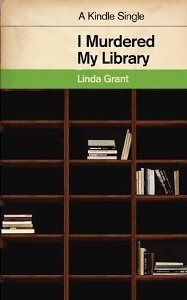What do you think?
Rate this book


70 pages, Kindle Edition
First published May 6, 2014
The glory of the library for me is how many of the books are in poor physical condition. They are books that have been read and read intensely. They are knocked about and shopworn. I would be ashamed of a book whose spine was not broken.
Books multiplied, books swarmed, books, I sometimes dreamt, seemed to reproduce themselves–they were a papery population explosion. When they had exhausted the shelves, they started to take over the stairs; I had to vacuum round them. You cannot have a taste for minimalist décor if you seriously read books.
The hundreds of books I had bought from Prospero’s in the two decades since I had moved into my flat came down from the shelves and were picked up by Chris, the manager of the Oxfam bookshop, in three carloads. This act, this murder, had its accomplices – my nephew and his wife, who ferried the rejects from the various floors down to the hall. They don’t read. They don’t read books. They have no books. My nephew’s wife took a suitcase full of the fashion monographs, but nothing else tempted them. The idea that I was building a library to bequeath to the next generation is one of the greatest fallacies of my life. The next generation don’t want old books – they don’t seem to want books at all.
I experienced the sense that I was making my library partly invisible. Without a physical presence on the shelves, the Kindle books seemed slightly insubstantial. There was no equivalent of the satisfying cracked spine.
On my brand-new Kindle, Galgut’s words were identical in their meaning to the ones that appeared in the paper product. As a work of literature, it was the same act of imagination as when he had originally typed it. The cover, paper, binding and font were extraneous. I had the peculiar sensation on my Kindle of mainlining directly into Galgut’s brain, without the intervening medium of the book’s aesthetics.
When I began to write on a computer, when I abandoned the typewriter, I didn’t look back. I don’t miss my turntable or my cassette player. I’m not a Luddite, I’m a Modernist. But the books seem not to be – not even the Modernists themselves, not James Joyce or Jean Rhys. A part of the cliff has fallen into the sea. There are not enough books here. The sight of the bare shelves shames me. What have I done?
“You cannot have a taste for minimalist décor if you seriously read books.”Humorous, comforting and thought-provoking, I Murdered My Library is author, Linda Grant’s homage to a lifetime spent between the covers of a book. Available as a Kindle single this is a comprehensive and lively little essay covering the problem Grant faced in 1994 after nineteen years of living in a spacious flat, with attics, eaves, landings and stairs, housing her vast collection of books. From evidence of past passions to multiple copies of her own books sent from her publishers, what started in selectively pruning back her collection ended in “rage and ruthlessness” as she prepared for her departure.